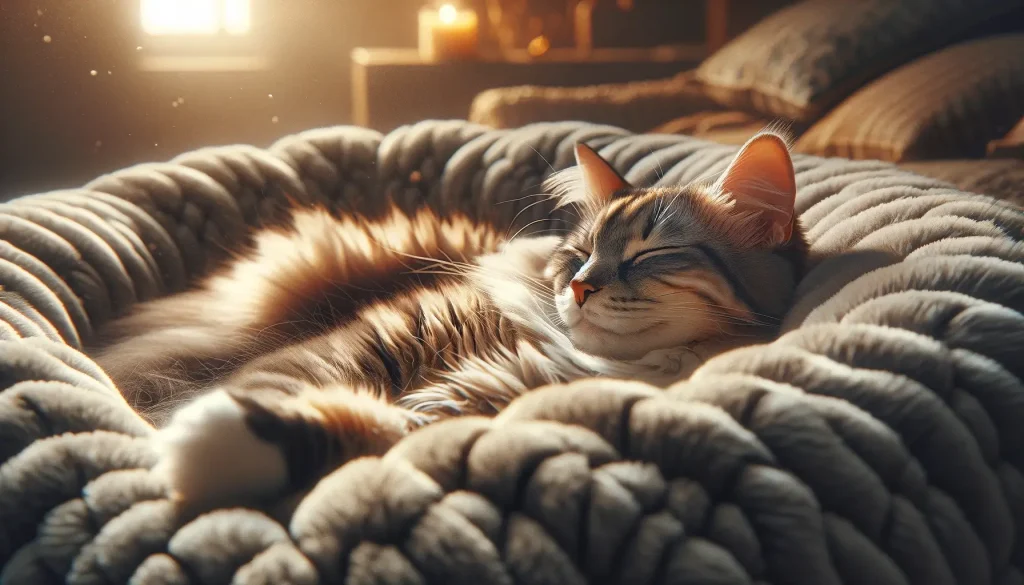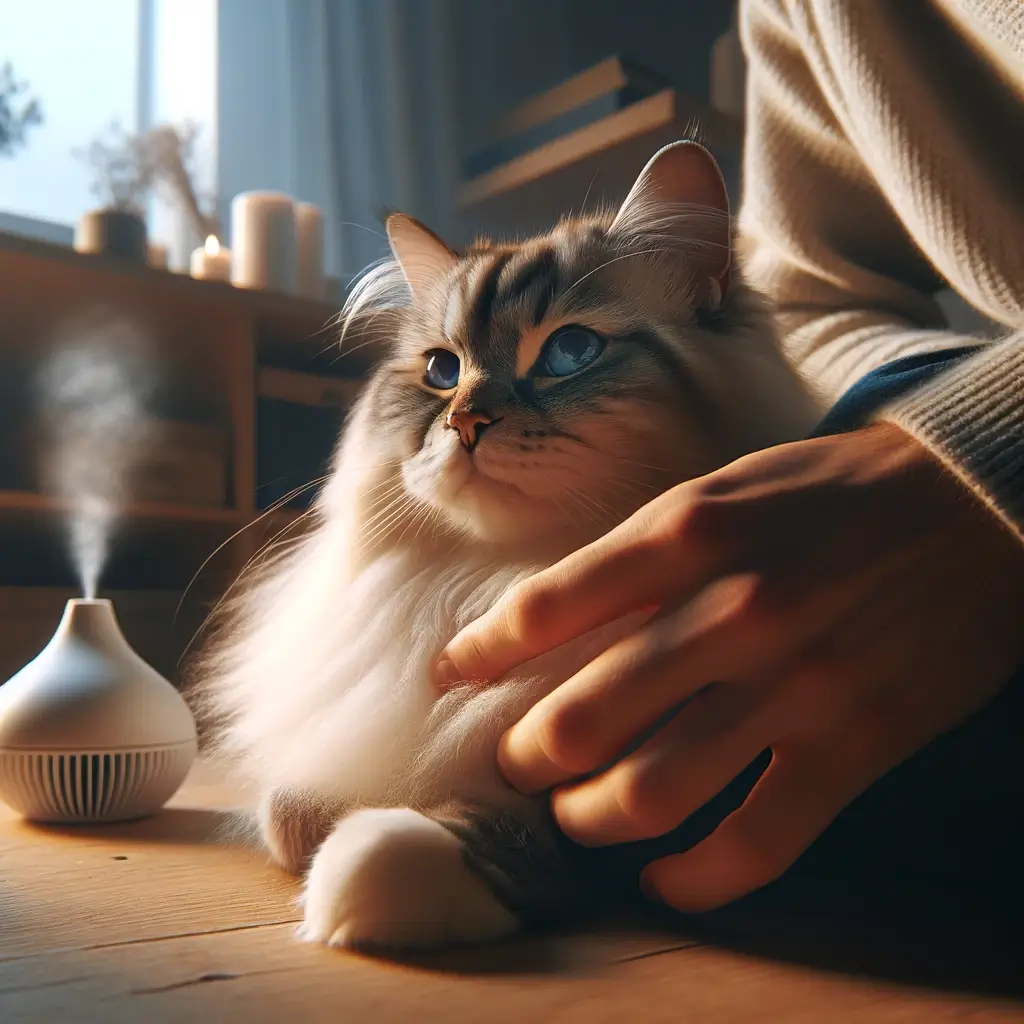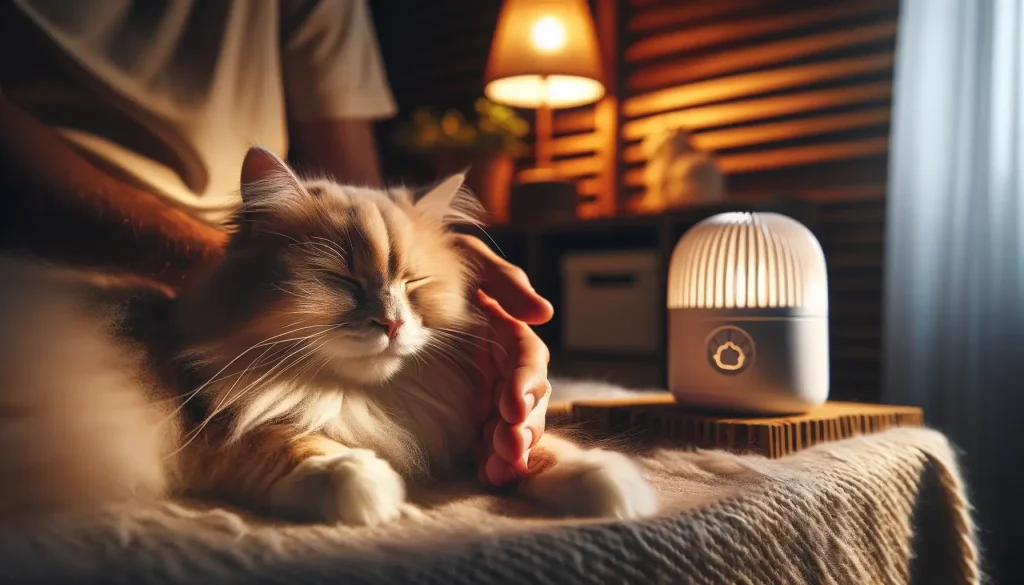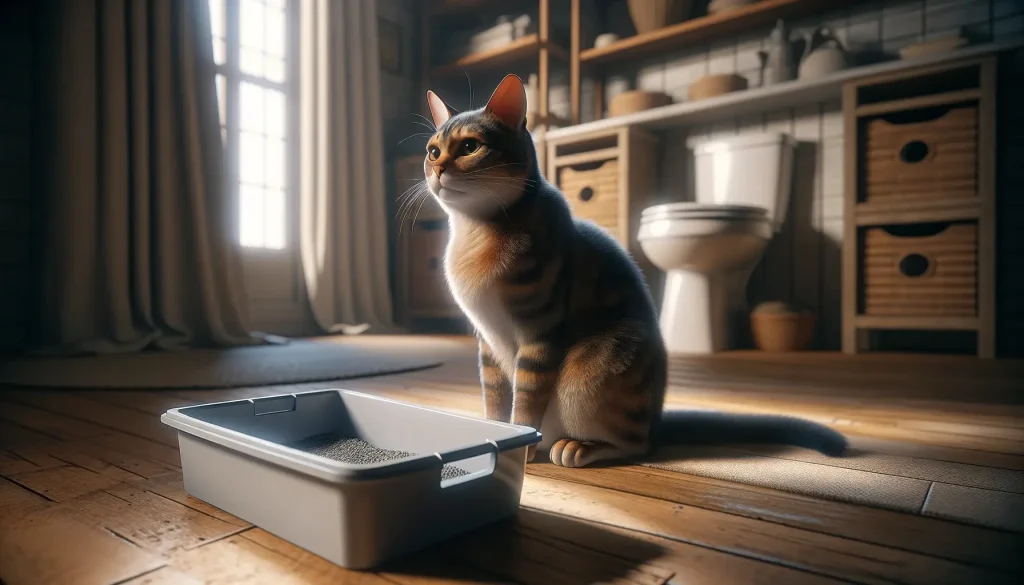
Understanding Your Cat’s Behavior in Heat
When your cat enters her heat cycle, you’ll likely notice a significant change in her behavior. Being more vocal, showing restlessness, and spraying urine around the house are clear signs your furry friend is experiencing a natural, although often challenging, phase. This can be quite taxing for both of you. Understanding why your cat behaves this way during her heat cycle is the first step towards providing her with the comfort and care she needs.
Female cats in heat experience a surge in hormones that drive them to seek out mates. This biological imperative explains their increased vocalization and territorial marking with urine. While these behaviors are entirely normal, they can disrupt your household’s peace. Hence, finding ways to calm your cat and reduce these behaviors is crucial for both your cat’s wellbeing and your sanity.
Calming a cat in heat involves several strategies:
- Avoid Access to Male Cats: Preventing contact with male cats is vital to avoid mating and additional heat cycles.
- Interactive Play: Engaging your cat in play can distract her from her instinctual urges.
- Calming Pheromones: Pheromone diffusers can help create a relaxing atmosphere for your cat.
- Utilizing Catnip: For some cats, catnip provides a temporary relaxation effect.
- Maintaining a Clean Litter Box: This helps reduce stress related to hygiene and territory.
- Providing Warmth: A heat pack can offer physical comfort to your cat.
- Considering Spaying: This is a permanent solution to prevent future heat cycles.
These steps, along with patience and understanding, play a significant role in helping your cat through her heat cycle comfortably. It’s important to remember that each cat reacts differently to various calming methods. What works for one may not work for another, so it might take some experimentation to find the right combination of techniques for your cat.
How Can You Calm A Cat In Heat Safely?
Here are some key steps recommended for calming a cat in heat:
- Keep Your Female Cat Away From Male Cats: This prevents mating and the stress of repeated heat cycles.
- Play With Your Cat: Interactive toys and playtime can distract and reduce her stress levels.
- Invest In A Pheromone Diffuser: Calming chemicals released by these diffusers may help soothe your cat.
- Try Catnip: It can relax some cats, though effects vary and are short-lived.
- Keep Her Litter Box Clean: This encourages proper behavior and reduces stress.
- Offer Her a Heat Pack to Sit On: Warmth can provide comfort to a cat in heat.
- Spay Your Cat: Spaying is the most effective way to prevent future heat cycles and stress.
Additionally, considering natural or synthetic calming agents like Feliway may create a more serene environment for your cat. Remember, understanding and patience are crucial during this time. But how exactly do these methods contribute to calming your feline companion, and what should you know before implementing them?


Home Care vs Vet Visit for Your Cat in Heat
When your cat is in heat, you can take several steps at home to help her feel more comfortable. But sometimes, professional help is needed. Knowing when to care for your cat at home and when to see a vet is crucial for her wellbeing.
Home Care Tips:
- Engage in Play: Use toys to keep her distracted.
- Use Pheromone Diffusers: These can reduce stress and create a calming environment.
- Try Catnip: For some cats, catnip works wonders, though its effects vary.
- Maintain Cleanliness: Keep her litter box spotless to avoid added stress.
- Provide Warmth: A heat pack or warm blanket can offer physical comfort.
These home care solutions often work well to calm a cat in heat. However, there are situations where a vet visit becomes necessary.
When to Visit the Vet:
- Behavior Changes Persist: If your cat’s behavior doesn’t improve or worsens, consult your vet.
- Health Concerns: Any signs of illness alongside her heat symptoms need vet attention.
- Spaying Consideration: Spaying is a definitive solution to stop the heat cycles. Discuss with your vet.
While home remedies can be effective, they are not substitutes for professional advice or care when it’s needed. Keeping a close eye on your cat’s behavior during her heat cycle will help you decide the best course of action. Remember, your vet is always the best source for questions regarding health and wellness.

Natural Relief Strategies for Cats in Heat
Exploring natural remedies to calm a cat in heat can offer gentle ways to soothe your pet’s discomfort. Alongside the practical measures already discussed, such as limiting access to male cats and engaging in playful activities, there are additional, less conventional methods that may provide relief. Herbal remedies, for example, have been used by some pet owners to alleviate stress in cats. Products containing valerian, chamomile, or lavender, known for their calming properties in humans, are sometimes suggested for pets as well. However, it’s important to proceed with caution and consult a veterinarian before introducing any new treatment to your cat’s regimen.
Adding environmental enrichments like climbing structures or hiding spots can also significantly reduce stress by offering your cat a physical outlet for her energy and a private retreat.
The role of diet in managing a cat’s behavior is often overlooked. Ensuring your cat has a balanced, nutritious diet can support overall health and wellbeing, potentially mitigating the intensity of heat-related stress.
Incorporating these natural and holistic approaches can complement the more direct methods of managing a cat in heat, providing a comprehensive strategy aimed at reducing both physical and psychological stress for your feline friend.
Create a Stress-Free Zone for Your Cat in Heat
Making your home a stress-free sanctuary can play a huge role in calming a cat in heat. Here are some tips:
- Limit Loud Noises: Try to keep your home as quiet as possible. Loud sounds can increase your cat’s stress.
- Establish a Safe Space: Set up a cozy area where your cat can retreat. A comfortable bed and her favorite toys can make a big difference.
- Keep Routine Consistent: Cats in heat can become anxious. Stick to a regular feeding and play schedule to provide a sense of security.
- Use Soft Lighting: Bright lights can be unsettling. Use soft, warm lighting to create a calming atmosphere.
- Consider Calming Music: Some studies suggest that certain types of music can calm pets. Playing soft, soothing tunes might help relax your cat.
Remember, every cat is different. What works for one may not work for another. It’s all about trying different strategies and observing what best helps your cat feel more at ease.

Quick Fixes for Midnight Meows
Bold questions about your cat’s nighttime vocal performances? If your furry friend’s in heat, those late-night concerts could be a cry for attention—or a sign of her natural cycle kicking into gear. Here’s the scoop on quieting the nocturnal noises:
Interactive Night Games: Tiring her out before bedtime can lead to quieter nights. Think of it as preparing a toddler for bedtime; a good play session can make all the difference.
Evening Relaxation Rituals: Establishing a calming pre-sleep routine can signal to your cat that it’s time to wind down. This might include a gentle grooming session or a few minutes of cuddles.
Nighttime Comforts: Ensure her sleeping area is inviting and comfortable. A cozy blanket in a quiet corner might just be the retreat she needs to settle down.
Late Night Snack: A small, light meal before bed can help satisfy her night cravings, making her less likely to wake you up.
The Silent Treatment: While it might seem cold, not responding to her nighttime calls can discourage her from repeating the behavior. It’s about setting boundaries.
Beginner Guide to Raising Quail at Home
What are the Signs of a Dog Concussion?
What Causes Your Dog’s Ears to Smell Bad?
When your dog’s ears start to emit an unpleasant odor, it might leave you puzzled…
Methimazole Treatment for Cat Hyperthyroidism
Methimazole plays a crucial role in managing feline hyperthyroidism, a condition marked by an overactive…
Got Hummingbirds in your Backyard? Here’s How to Care for Them.
Why Does Your Cat Pee Outside the Litter Box?
Cat’s Litter Box Issues It’s not uncommon for cat owners to face the frustrating dilemma…




